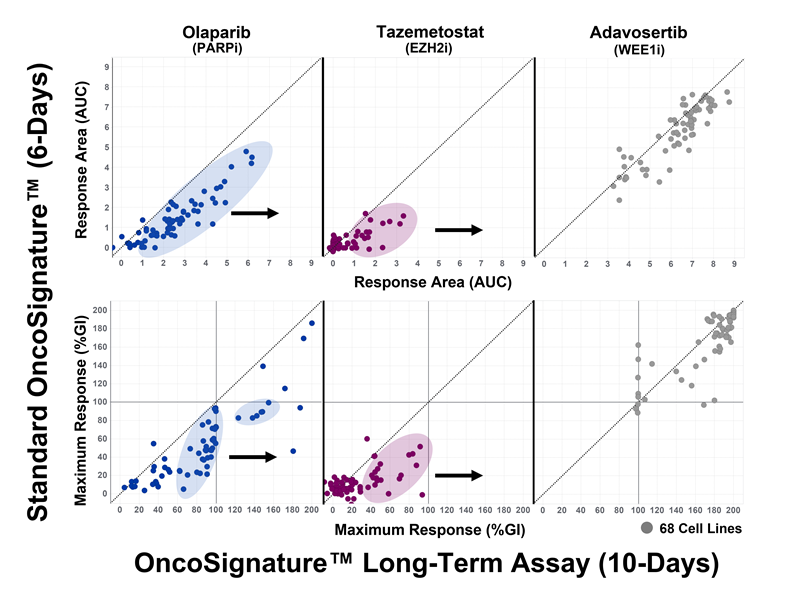The 2D OncoSignature™ Long-Term Assay drug discovery screening service profiles your compounds or biologics of interest as single or combination therapies, for 10 days.
When working with slower acting drugs or agents running a cell panel screening assay over a prolonged period can identify drug efficacy and provide you with valuable insights that standard assays could miss. Our long-term assay service has been carefully designed by screening experts with stringent controls applied to minimize potential variability and ensure reliable results are provided in fast turnaround times.
OncoSignature™ Long-Term Assay
Our long-term assay allows for screening across a diverse, clinically relevant cell line panel or a more focused, tissue-specific panel, that runs for 10 days. We test your agents in a fully optimized platform specifically, designed for slower acting agents and epigenetic targets, to help identify potential therapeutics.
Key advantages:
- Fully automated high throughput screening platform
- Continual screening cycle, flexible onboarding and compound submission
- Fast turnaround times, 248 cell lines in 5 months
- Dedicated project manager, simple project initiation with regular project updates and interim data
- Detailed final report, raw data files and proprietary Chalice™ software
- High quality data analysis, reliable and reproducible

Oncosignature Long-Term Assay (LTA): cell panel screening of slower-acting therapeutics
What is the Long-Term Assay?
A long-term assay is designed to be run over a prolonged period (10 days) to study the extended effects of a particular treatment on cancer cell lines. These assays are particularly useful when working on epigenetic targets with slower acting drugs or agents which require prolonged exposure to be effective. For epigenetic targets, long-term assays are used to study the effects of compounds on DNA methylation patterns across a panel of cancer cell lines and the effects on histone modification patterns in particular tissue types. The data obtained from a long-term assay can provide important insights into the mechanisms of action of the drug and help identify potential therapeutic targets for the treatment of cancer.
Why use a Long-Term Assay for drug discovery?
Epigenetics offers the opportunity to identify new therapeutic targets for novel drug discovery and is a key area for cancer research. Epigenetic agents are typically studied using cellular assays and require longer time points to see their full effects; conventional 3–6-day assay windows may not offer the resolution needed to identify or resolve the full cellular response. In addition, by using long-term assays in combination with other cancer therapies, such as chemotherapy, effectiveness can be improved.
Main applications of 2D OncoSignature™ Long-Term Assay screening service
- Study drug response by identifying sensitive and resistant cells at much higher resolution
- Aid patient stratification for your drug candidate or drug combination
- Speed development of certain classes of long-acting drugs by identifying drug combinations over extended time points
Contact Us
Discuss your long-term assay needs
View the key features and what your final report will consist of. Discuss your project with our team today.
Download Long-Term Assay application note
2D OncoSignature Long-Term Assay: Extending the reach of cell panel screens
Understand the scientific data behind the long-term assay service and how it enables the profiling of slower acting or epigenetic drugs
Advantages of long-term assays
Read an expert interview on long-term assays
Dr. David Sorrell provides his expertise around epigenetics, phenotypic screening, and long-term assay technologies
Watch OncoSignature™ Long-Term Assay Webinar
On-demand webinar - Extending the reach of cell panel screens
Learn about the long-term assay service and advantages it can have for characterizing slower acting drugs as presented by Dr. David Sorrell
Read OncoSignature™ Long-Term Assay Blog
Learn more about OncoSignature™ long-term assay services
Get insights about our OncoSignature™ long-term screening services for slow acting and epigenetic drug discovery.

